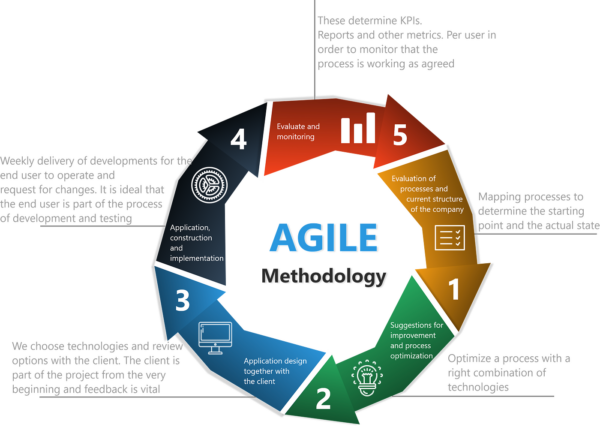Brief Information
Agile methodology is a project management approach characterized by iterative development, collaboration, and flexibility. It prioritizes adaptive planning, evolutionary development, early delivery, and continuous improvement. Originating from the Agile Manifesto, it emphasizes individuals and interactions over processes and tools, working software over comprehensive documentation, customer collaboration over contract negotiation, and responding to change over following a plan.
Detailed Information
Agile methodology is a set of principles for software development under which requirements and solutions evolve through the collaborative effort of cross-functional teams. It promotes adaptive planning, evolutionary development, early delivery, and continuous improvement, and it encourages rapid and flexible response to change.
Analysis of Key Features
Key features of Agile methodology include:
- Iterative and incremental development
- Collaboration between self-organizing, cross-functional teams
- Emphasis on delivering working software in short timeframes
- Flexibility and responsiveness to change
- Continuous feedback loops for improvement
- Emphasis on simplicity and communication
Types of Agile Methodology
There are several types of Agile methodologies, including:
- Scrum
- Extreme Programming (XP)
- Kanban
- Lean Software Development
- Crystal
- Dynamic Systems Development Method (DSDM)
- Feature-Driven Development (FDD)
Each of these methodologies has its own principles, practices, and techniques tailored to specific project needs.
Ways to Use Agile Methodology
Agile methodology can be used in various contexts, including:
- Software development projects
- Product development
- Marketing campaigns
- Research and development
- Team collaboration and management
Problems and Solutions
Common problems with Agile methodology include:
- Scope creep
- Team member burnout
- Lack of stakeholder engagement
- Poorly defined roles and responsibilities
These problems can be addressed through:
- Regular communication and collaboration
- Clear project goals and priorities
- Stakeholder involvement throughout the process
- Continuous reflection and adaptation
Characteristics and Comparisons
| Characteristic | Agile Methodology | Traditional Waterfall Model |
|---|---|---|
| Development Approach | Iterative and incremental | Sequential |
| Flexibility | High | Low |
| Customer Involvement | Continuous throughout | Limited to requirements phase |
| Documentation | Minimal | Extensive |
| Response to Change | Embraced | Resistant |
Future Perspectives and Technologies
The future of Agile methodology lies in:
- Integration with emerging technologies like AI and automation
- Adoption in non-software industries such as healthcare and finance
- Continuous evolution to meet the changing needs of the market
VPN and Agile Methodology
VPN can be used in conjunction with Agile methodology to:
- Facilitate secure remote collaboration among team members
- Ensure data privacy and confidentiality during project development
- Enable seamless access to project resources and tools from anywhere
Resources for More Information
- Agile Alliance (https://www.agilealliance.org/)
- Scrum.org (https://www.scrum.org/)
- Kanbanize (https://kanbanize.com/)
- Lean Software & Systems Consortium (http://leanssc.org/)


